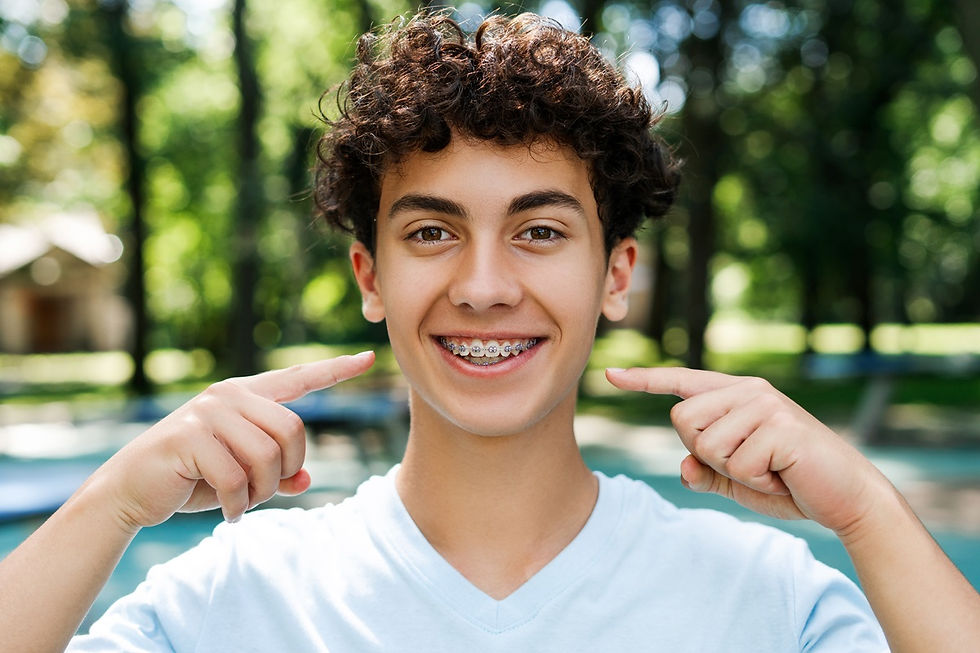Is It Safe to Get Teeth Whitened Not at a Dentist?
- primarydental353
- Jul 24, 2024
- 4 min read

Teeth whitening has become increasingly popular as people seek brighter smiles. While professional teeth whitening at a dentist's office is often considered the safest and most effective method, many opt for at-home treatments or services offered outside of a dental practice. This raises the question: Is it safe to get teeth whitened not at a dentist?
Understanding Teeth Whitening Methods
Before diving into the safety concerns, it's important to understand the different teeth whitening methods available.
Over-the-Counter Whitening Products
Many people use over-the-counter (OTC) products like whitening toothpaste, strips, gels, and rinses. These products are widely accessible and relatively affordable. However, they often contain lower concentrations of whitening agents compared to professional treatments, leading to less noticeable results over a longer period.
At-Home Whitening Kits
At-home whitening kits, available online or in stores, come with custom or semi-custom trays and a bleaching agent. While these kits can be effective, the results can vary significantly based on the product's quality and the user's adherence to instructions.
Whitening Services at Salons or Spas
Some salons and spas offer teeth whitening services, often marketed as quick and convenient alternatives to dental visits. These services typically use LED lights or other devices to enhance the whitening process, but the staff may lack the dental training required to ensure safety and effectiveness.
Natural and DIY Remedies
Many individuals turn to natural or DIY remedies for teeth whitening, such as baking soda, hydrogen peroxide, or activated charcoal. While these methods are cost-effective, they can pose significant risks if not used correctly.
Risks of Non-Dental Teeth Whitening
Choosing teeth whitening services outside of a dental office can pose various risks. Here are the potential dangers associated with non-dental teeth whitening methods.
Incorrect Application
Non-professional teeth whitening can lead to incorrect application of bleaching agents. Without proper training, it’s easy to apply too much or too little product, which can result in uneven whitening or damage to the teeth and gums.
Use of Unsafe Products
Products used in non-dental settings may not always meet safety standards. Some whitening agents may contain harmful chemicals that can cause adverse reactions or damage the enamel and soft tissues in the mouth.
Lack of Supervision
In a non-dental setting, there is often a lack of professional supervision. A dentist can monitor the progress and adjust the treatment if necessary, ensuring that the whitening process is safe and effective. Without this oversight, there’s a higher risk of complications.
Gum Irritation and Sensitivity
Improper use of whitening agents can lead to gum irritation and increased tooth sensitivity. Professional teeth whitening in Denver, performed by a dentist, involves protective measures to shield the gums and minimize discomfort.
Ineffective Results
Non-dental whitening treatments may not deliver the desired results. The effectiveness of over-the-counter products and non-professional services can be inconsistent, leaving you disappointed with the outcome.
Potential for Overuse
Overusing whitening products, especially without guidance from a dentist, can damage the enamel and lead to permanent sensitivity. Dentists provide tailored advice on the frequency and duration of whitening treatments to prevent overuse.
Benefits of Professional Teeth Whitening
Opting for professional teeth whitening in Denver has several advantages over non-dental methods. Here’s why professional treatment is considered safer and more effective.
Customized Treatment Plans
Dentists create customized treatment plans based on your specific needs and dental health. This personalized approach ensures optimal results and minimizes risks.
Higher Concentration of Whitening Agents
Professional treatments use higher concentrations of whitening agents, leading to more effective and longer-lasting results compared to over-the-counter products.
Professional Monitoring
During a professional whitening session, a dentist monitors the entire process, making adjustments as needed to ensure safety and effectiveness. This supervision helps prevent complications like gum irritation and excessive sensitivity.
Immediate Results
Professional teeth whitening in Denver can deliver immediate results, often in just one visit. Non-dental methods typically take longer to show noticeable improvements.
Safety Measures
Dentists take necessary safety measures to protect your gums and other soft tissues during the whitening process. They use protective barriers and carefully apply the bleaching agent to avoid any harm.
Comprehensive Oral Health Care
A dentist can provide comprehensive oral health care, addressing any underlying issues that may affect the whitening process. They can also offer post-whitening care and advice to maintain your bright smile.
Minimizing Risks
With professional whitening, the risk of adverse effects is significantly reduced. Dentists are trained to handle complications and provide immediate solutions if any issues arise during the treatment.
Long-Term Maintenance
Dentists can recommend long-term maintenance plans to keep your teeth white and healthy. They provide advice on lifestyle changes, touch-up treatments, and oral hygiene practices to prolong the results.
While it may be tempting to try non-dental teeth whitening methods due to convenience or cost, the risks often outweigh the benefits. For safe and effective teeth whitening in Denver, professional treatment by a dentist is the best option. Not only does it provide superior results, but it also ensures the health and safety of your teeth and gums. Remember, your smile is an important asset, and it's worth investing in professional care to achieve the best possible outcome.



Comments